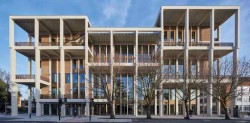Kingston University Town house is a stunning six storey mixeduse teaching building that offers a vibrant new face to the University. It is formed with a structural precast concrete frame and has been designed to encourage collaboration and exchange by student and general public users.
The building is formed with a structural precast concrete frame taking the form of a series of interlocking, open-plan volumes enveloped by a façade of colonnades, all with extensive exposed internal and external high quality concrete finishes. Designed by Grafton Architects the BREEAM Excellent rated building used PCE’s HybriDfMA bespoke system that proved to be versatile and successful in achieving the client's high expectations.
PCE was appointed as specialist structural frame contractor responsible for the detailed design, manufacture and construction of the circa £8million structural package. A fully co-ordinated building information management (BIM) approach, to BIM Level II protocols was adopted by PCE and the other parties with special emphasis being placed on pursuing a design for manufacture and assembly approach (DfMA) to enable certainty of the hybrid structural component construction. The internal structure of the building provides a threedimensional matrix, one singular complex space, which links the various required uses to one another, while at the same time giving each its own identity and privacy.
Externally the façade is made up of an open undercroft colonnade at ground floor to invite public use and activity, above which three cascading terraces form hanging gardens giving a sense of landscape connecting from ground level to the top of the building. PCE’s HybriDfMA expertise using a mix of structural and architectural precast and insitu concrete, together with structural steelwork, enabled the longspan requirements for such an ‘open’ building, some in excess of 15 metres, to be easily accommodated, as well 1 as high quality finishes without the requirement for extensive following trades, and incorporation into the structure of an embedded pipework system to provide thermal control of the internal environment using concrete’s thermal storage abilities.
The majority of the structure was completely exposed, utilising the exposed concrete soffits and the thermal mass of the building as part of the heating and ventilation strategy along with expressing the majority of the vertical structure as part of the internal finishes. This was complemented externally with a reconstructed stone facade and structural colonnade with exposed walkway slabs and feature stairs.









